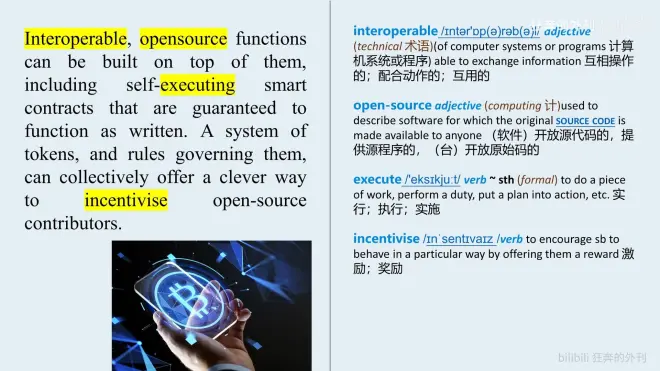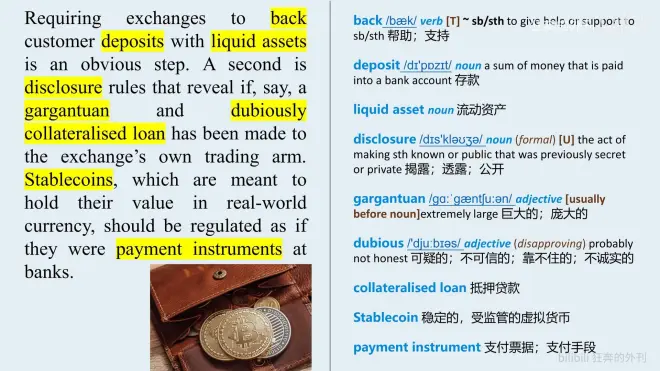外刊听读| 经济学人 FTX引发的币圈灾难


Leaders
社论
Crypto’s downfall
加密货币的灾难
The collapse of FTX has dealt a catastrophic blow to crypto’s reputation and aspirations. Is this the end?
FTX的崩溃对加密货币的声誉和前景造成了灾难性打击,该行业到此为止了吗?
1 THE FALL from grace was hard and fast. Only a fortnight ago Sam Bankman-Fried was in the stratosphere. FTX, his cryptocurrency exchange, then the third-largest, was valued at $32bn; his own wealth was estimated at $16bn. To the gushing venture capitalists (VCs) of Silicon Valley he was the financial genius who could wow investors while playing video games, destined, perhaps, to become the world’s first trillionaire. In Washington he was the acceptable face of crypto, communing with lawmakers and bankrolling efforts to influence its regulation.



失去信任的速度又快又狠。仅仅两星期前,Sam Bankman-Fried还是业内的风云人物。他的加密货币交易所FTX,是当时业内第三大交易所,估值为320亿美元;他自己的财富预计在160亿美元。对于硅谷的风险投资家(VC)来说,他是一个金融天才,可以在玩电子游戏的同时让投资者惊叹,也许他注定要成为世界上第一个亿万富翁。在华盛顿,他是令人满意的加密货币脸面,与立法者沟通,影响监管,为行业注资。
2 Today there is nothing left but 1m furious creditors, dozens of shaky crypto firms and a proliferation of regulatory and criminal probes. The high-speed implosion of FTX has dealt a catastrophic blow to an industry with a history of failure and scandals. Never before has crypto looked so criminal, wasteful and useless.


今天,除了100万愤怒的债权人、几十家摇摇欲坠的加密货币公司、大量监管和刑事调查外,什么都没有留下。FTX的迅速崩溃,给这个有着失败和丑闻历史的行业带来了灾难性打击。在此之前,加密货币从未显得如此罪恶、浪费和无用。
3 The more that comes out about the demise of FTX, the more shocking the tale becomes. The exchange’s own terms of service said it would not lend customers’ assets to its trading arm. Yet of $14bn of such assets, it had reportedly lent $8bn-worth to Alameda Research, a trading firm also owned by Mr Bankman-Fried. In turn, it accepted as collateral its own digital tokens, which it had conjured out of thin air. A fatal run on the exchange exposed the gaping hole in its balance-sheet. To cap it all, after FTX declared bankruptcy in America, hundreds of millions of dollars mysteriously flowed out of its accounts.


关于FTX倒闭的消息越多,这个事件就越令人震惊。该交易所的服务条款声称自己不会将客户的资产借给其交易部门。然而,据报道,在140亿美元的资产中,它将80亿美元借给了Alameda Research,这是一家同样由Bankman-Fried先生拥有的交易公司。Alameda Research转而接受自己的数字代币作为抵押品,这些数字代币是凭空变出来的。交易所的一次致命的挤兑暴露了其资产负债表的漏洞。最重要的是,在FTX在美国宣布破产后,数以亿计的美元神秘地从其账户中流出。
4 Big personalities, incestuous loans, overnight collapses— these are the stuff of classic financial manias, from tulip fever in 17th-century Holland to the South Sea Bubble in 18th-century Britain to America’s banking crises in the early 1900s. At its peak last year, the market value of all cryptocurrencies surged to the giddy height of almost $3trn, up from nearly $800bn at the start of 2021. Today it is back at $830bn.


大人物、排外贷款、一夜崩盘--这些都是经典的金融狂热素材,从17世纪荷兰的郁金香狂热到18世纪英国的南海泡沫事件,再到20世纪初的美国银行危机。在去年的加密货币高峰期,它的市场价值从2021年初的近8000亿美元飙升至近令人眩晕的3万亿美元。今天,它又回到了8300亿美元的水平。
5 As at the end of any mania, the question now is whether crypto can ever be useful for anything other than scams and speculation. The promise was of a technology that could make financial intermediation faster, cheaper and more efficient. Each new scandal that erupts makes it more likely that genuine innovators will be frightened off and the industry will dwindle. Yet a chance remains, diminishing though it is, that some lasting innovation will one day emerge. As crypto falls to Earth, that slim chance should be kept alive.


就像任何狂热的结束一样,现在的问题是,除了骗局和投机,加密货币是否还能用于其他用途。技术是一种承诺,可以使金融中介机构更快、更便宜、更高效。每一个新的丑闻的爆发,都可能吓跑真正的创新者,缩小行业规模。然而,仍然有一个机会,尽管可能性正在减少,但总有一天会出现一些持久的创新。当加密货币坠落到地球上时,这个微弱的机会应该被保留下来。
6 Amid the wreckage of the past week, it is worth remembering the technology’s underlying potential. Conventional banking requires a vast infrastructure to maintain trust between strangers. This is expensive and is often captured by insiders who take a cut. Public blockchains, by contrast, are built on a network of computers, making their transactions transparent and, in theory, trustworthy. Interoperable, opensource functions can be built on top of them, including self-executing smart contracts that are guaranteed to function as written. A system of tokens, and rules governing them, can collectively offer a clever way to incentivise open-source contributors. And arrangements that would be expensive or impractical to enforce in the real world become possible— allowing artists to retain a stake in the profits from the resale of their digital works, for instance.




在过去一周的残局中,值得被人记住的是加密货币的隐含潜力。传统银行业需要庞大的基础设施来维持陌生人之间的信任。这是很昂贵的,而且往往由内部人士掌握,从中获利。相比之下,公共区块链建立在计算机网络上,使其交易变得透明,理论上它是值得信赖的。互用、开源的功能建立在公共区块链之上,其中包括自我执行的智能合约,以保证系统按规定运行。信物系统和管理规则,可以共同提供一种激励开源贡献者的巧妙方式。使得在现实世界中昂贵或不切实际的安排成为可能--例如,允许艺术家从售出的数字作品利润中保留自己的股份。
7 The disappointment is that, 14 years after the Bitcoin blockchain was invented, little of this promise has been realised. Crypto’s frenzy drew in talent from bright graduates to Wall Street professionals, and capital from VC firms, sovereign-wealth and pension funds. Vast quantities of money, time, talent and energy have been used to build what amount to virtual casinos. Efficient, decentralised versions of mainstream financial functions, such as currency exchanges and lending, exist. But many consumers, fearful of losing their money, do not trust them. Instead they are used to speculate on unstable tokens. Money-launderers, sanctions- dodgers and scammers abound.



令人失望的是,在比特币区块链发明的14年后,这种承诺几乎没有实现。加密货币的狂热吸引了各路人才,从聪明的毕业生到华尔街专业人士,以及来自风险投资公司、主权财富和养老基金的资本。大量的资金、时间、人才和精力被用来建立相当于虚拟赌场的东西。主流金融体系中已经存在更加高效、去中心化的部分,如货币交换和借贷。但许多消费者害怕失去自己的钱财,并不信任它们。相反,他们的金钱被用来炒作不稳定的代币。洗钱、逃避制裁和诈骗的人比比皆是。
8 Presented with all this, a sceptic might say that now is the time to regulate the industry out of existence. But a capitalist society should allow investors to take risks in the knowledge that they will make losses if their bets go sour. Even as crypto has imploded, the spillovers to the wider financial system have been manageable. FTX’s backers included Sequoia, a Californian VC firm; Temasek, a Singaporean sovereign-wealth fund; and the Ontario Teachers’ Pension Plan. All have lost money, but none catastrophically.


面对这一切,一个怀疑论者可能会说,现在是监管该行业的时候了。但是,一个资本主义社会应该允许投资者承担风险,因为他们知道,如果赌注恶化,自己会有损失。即使加密货币已经崩溃,对更广泛的金融系统的影响也是可控的。FTX的资助者包括加州风险投资公司红杉资本、新加坡主权财富基金淡马锡和安大略省教师退休基金会。所有这些公司都承担了亏损,但都没有造成灾难性的后果。

9 Moreover, sceptics should acknowledge that nobody can predict which innovations will bear fruit and which will not. People should be free to devote time and money to fusion power, airships, the metaverse and a host of other technologies that may never come good. Crypto is no different. As the virtual economy develops, useful decentralised applications may yet appear—who knows? The underlying technology continues to improve. An upgrade to Ethereum’s blockchain in September radically reduced its energy consumption, paving the way for it to handle high transaction volumes efficiently.


此外,怀疑论者应该承认,没有人能够预测哪些创新会开花结果,哪些不会。人们应该自由地将时间和金钱投入到核聚变能源、飞艇、元宇宙和其他许多可能永远都不会有好结果的技术。加密货币也不例外。随着虚拟经济发展,有用的去中心化应用可能还会出现,谁知道呢?底层技术在不断改进。9月,以太坊区块链的升级从根本上降低了其能源消耗,为其高效处理大交易量创造了条件。
10 Instead of over-regulating or stamping out crypto, regulators should be guided by two principles. One is to ensure that theft and fraud are minimised, as with any financial activity. The other is to keep the mainstream financial system insulated from further crypto-ructions. Although blockchains were explicitly designed to escape regulation, these principles justify regulating the institutions that act as gatekeepers for the cryptosphere. Requiring exchanges to back customer deposits with liquid assets is an obvious step. A second is disclosure rules that reveal if, say, a gargantuan and dubiously collateralised loan has been made to the exchange’s own trading arm. Stablecoins, which are meant to hold their value in real-world currency, should be regulated as if they were payment instruments at banks.



监管机构不应过度监管或取缔加密货币,而是以两个原则为指导。一个是确保最小化盗窃和欺诈行为的影响,就像任何金融活动一样。另一个是保持主流金融系统与进一步的加密货币结构绝缘。虽然区块链被明确设计为可以逃避监管的交易方式,但这种设计合理化了监管机构要成为加密货币圈的把关系统。要求交易所的流动资产支持客户存款是一个明显的监管步骤。其次是披露币圈规则,揭示是否有巨大的和可疑的抵押贷款被提供给交易所自己的交易部门。稳定的加密货币旨在对现实世界的货币保持其价值,它们应该像银行的支付工具一样受到监管。
Tulip bulb or light bulb?
郁金香球茎还是电灯泡?
11 Whether crypto survives, or becomes a financial curiosity like the tulip bulb, will not ultimately depend on regulation. The more scandals ensue, the more the whole enterprise and its aspirations become tainted. The lure of innovation means nothing if investors and users fear their money will disappear into thin air. For crypto to rise again, it must find a valid use that leaves the dodginess behind.


加密货币是存活下来,还是成为像郁金香球茎一样的金融珍品,它的命运从根本上并不取决于监管。丑闻越多,整个行业和它的前景就越有污点。如果投资者和用户担心他们的钱会凭空消失,那么创新的诱惑就毫无意义。要想让加密货币再次崛起,它必须找到一个合理的用途,把冒险精神抛在脑后。

